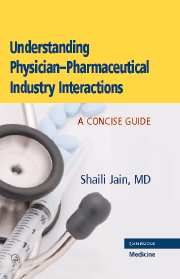Book contents
- Frontmatter
- Contents
- Acknowledgments
- Foreword
- Introduction
- 1 Gifts from the Pharmaceutical Industry to Physicians: Do They Influence your Prescribing?
- 2 Ethical Considerations of Receiving Gifts from the Pharmaceutical Industry
- 3 One on One: An Analysis of the Physician–Pharmaceutical Company Representative (PCR) Detailing Interaction
- 4 Medical Academia and the Pharmaceutical Industry
- 5 Teaching Physicians in Training about Pharmaceutical Industry Promotion
- 6 Continuing Medical Education: How to Separate Continuing Medical Education from Pharmaceutical Industry Promotion
- 7 Professional Policies on Physician–Pharmaceutical Industry Interaction (PPII)
- 8 Preserving Professionalism: Patients' Perceptions of Physicians' Acceptance of Gifts from the Pharmaceutical Industry
- 9 To Sample or Not to Sample? The Use of Pharmaceutical Industry–Supplied Medications in Medical Practice
- 10 Physician–Pharmaceutical Industry Interactions (PPIIs), the Law and the Media
- 11 Direct-to-Consumer Advertising (DTCA)
- 12 Pharmaceutical Industry Interactions with Health Care Professionals: A Global Perspective
- 13 Internet Resources for Teaching about PPII and Independent Sources of Information about Prescription Medicines
- Appendix I
- Appendix II
- Index
- References
2 - Ethical Considerations of Receiving Gifts from the Pharmaceutical Industry
Published online by Cambridge University Press: 03 March 2010
- Frontmatter
- Contents
- Acknowledgments
- Foreword
- Introduction
- 1 Gifts from the Pharmaceutical Industry to Physicians: Do They Influence your Prescribing?
- 2 Ethical Considerations of Receiving Gifts from the Pharmaceutical Industry
- 3 One on One: An Analysis of the Physician–Pharmaceutical Company Representative (PCR) Detailing Interaction
- 4 Medical Academia and the Pharmaceutical Industry
- 5 Teaching Physicians in Training about Pharmaceutical Industry Promotion
- 6 Continuing Medical Education: How to Separate Continuing Medical Education from Pharmaceutical Industry Promotion
- 7 Professional Policies on Physician–Pharmaceutical Industry Interaction (PPII)
- 8 Preserving Professionalism: Patients' Perceptions of Physicians' Acceptance of Gifts from the Pharmaceutical Industry
- 9 To Sample or Not to Sample? The Use of Pharmaceutical Industry–Supplied Medications in Medical Practice
- 10 Physician–Pharmaceutical Industry Interactions (PPIIs), the Law and the Media
- 11 Direct-to-Consumer Advertising (DTCA)
- 12 Pharmaceutical Industry Interactions with Health Care Professionals: A Global Perspective
- 13 Internet Resources for Teaching about PPII and Independent Sources of Information about Prescription Medicines
- Appendix I
- Appendix II
- Index
- References
Summary
Brenda had had a busy afternoon. Her company had provided funds for two internal medicine residents to attend a national cardiology conference in New York. Even though nominations of the residents and payment for the event were coordinated through the department, Brenda was keen to spend some time with the chosen residents at the conference. She had successfully contacted one of them, Jack, and invited him and his colleague to dinner the evening before the conference. Brenda knew from her chats with Gloria, the residency coordinator, that Jack was a highly valued resident with aspirations to be a cardiologist. She was keen to talk to him more about the new antihypertensive medication Lowpress. The dinner would be an ideal opportunity to do this, so Brenda set about booking a table at one of the finest restaurants in New York.
Prescribing medication is not a simple technical action; it is a complex social interaction with many levels of meaning. Ethical medication giving requires an awareness of the importance and the inevitability of these many layers of meaning and their effects. Physicians who receive free gifts from the pharmaceutical industry need to be aware of the ethical issues that are raised and their possible effects on the action of prescribing.
Conflict of Interest
Physicians have an ethical duty to serve the interests of their patients and to avoid potential conflicts that might divert them from that commitment.
- Type
- Chapter
- Information
- Understanding Physician-Pharmaceutical Industry InteractionsA Concise Guide, pp. 7 - 11Publisher: Cambridge University PressPrint publication year: 2007



